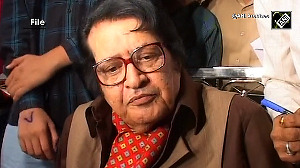A central government employee is entitled to 30 days of earned leave every year. For the civilian staff, there are eight more days of casual leave and 20 days of half-pay leave, which can be commuted to medical leave. In addition, there are two restricted holidays and 17 "gazetted" holidays, including the three national holidays.
If you add to this 52 Saturdays and 52 Sundays every year, when government offices are closed, the total number of holidays a central government employee can enjoy is 171 days. That is close to half the number of days in a year.
This context has to be kept in mind before judging what may well turn out to be the Sixth Pay Commission's most controversial recommendation. To be sure, the Pay Commission does not favour a reduction in the number of earned or casual leave to which an employee is entitled.
Nor does it propose switching back to the six-day week system, in vogue before Rajiv Gandhi as prime minister introduced five-day weeks in the late 1980s. There is no doubt that recommending either of these steps would have caused an even bigger controversy. Indeed, the Fifth Pay Commission had recommended a switch-back to the six-day week system and the government then lost no time in rejecting the suggestion.
But what the Sixth Pay Commission has done, thereby stirring up a hornet's nest, is to abolish the idea of "gazetted" holidays, which in government parlance means days when all central government offices, irrespective of where they are located, are closed.
Instead of "gazetted" holidays, there should be only three national holidays, says the Commission. In addition, employees will be given the option of taking leave on eight restricted holidays to be declared by the government at the start of the year.
Heads of individual departments will be allowed the option of declaring the office closed for a maximum of two restricted holidays in a year based on local considerations (like transport availability or the nature of the festival) and in consultation with the employees. All employees will be deemed to have availed of their restricted holidays on those two days.
Thus, the total number of holidays for central government employees will be reduced from 171 to 165 days, if the Sixth Pay Commission's recommendations are accepted. The loss of even six holidays will hurt the government employees, particularly when they realise that the actual increase in their pay packages has been fairly moderate.
Though the idea of doing away with "gazetted" holidays (most of which are on account of religious festivals) is commendable, there will be many practical problems in implementing it. Employees may still be convinced and persuaded to accept a reduced number of holidays in a year. But the very thought of implementing the new system will give nightmares to heads of departments in various government offices.
Consider how the head of a department of a central government office in New Delhi will handle the situation. It is likely that the two restricted holidays when he would have the office closed will be for Holi and Diwali. That would mean that he would have to keep the office open on Dussehra, Christmas and on a few other religious holidays, even though most of the employees would have availed of their restricted holidays on those days. If the department is engaged in public-dealing, then the problem gets even more complicated.
The head of the department has to deploy adequate staff to maintain the services, incurring additional costs on over-time payments. The government's overall maintenance costs will also go up as offices can be closed only on five days in a year, compared to 17 days earlier.
This is not to argue that abolishing "gazetted" holidays is a bad idea. As a matter of principle, "gazetted" holidays on account of religious festivals should have been scrapped long ago. Most private sector companies manage with ten or even fewer holidays on account of these festivals and allow their offices in different regions follow their own schedule within an overall cap on the total number of holidays.
If the private sector can manage this, there is no reason why the government or its departments across the country cannot follow a similar system.
Decisions on all holidays except the three national holidays can be taken by the local offices in consultation with their headquarters. The local offices will also have to be empowered to take decisions on how to run their departments on days there will be poor attendance because of these restricted holidays.
The point is that the Sixth Pay Commission's recommendation on abolishing "gazetted" holidays can be implemented only when the central government is prepared to take a host of other downstream steps to reform the administrative system.
The Fifth Pay Commission also had recommended that government offices should remain closed only on national holidays and the employees should be given a larger number of restricted holidays. That recommendation was not accepted. The Sixth Pay Commission has made a stronger case for abolishing "gazetted" holidays. The government should not reject this idea without giving it a serious try.







 © 2025
© 2025